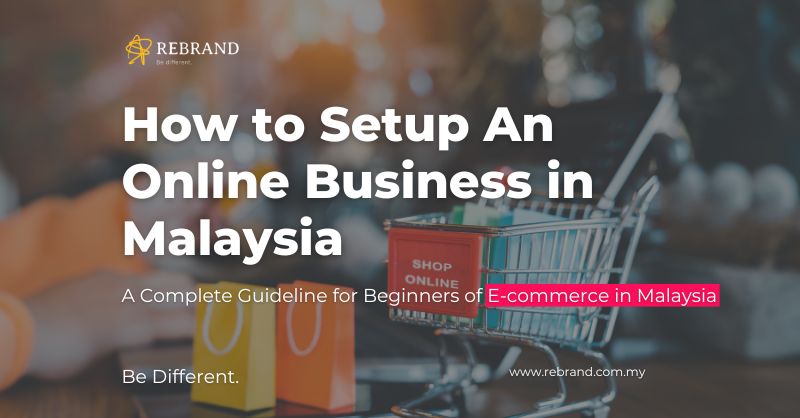Post Pandemic Era: Is Online Business Malaysia Still Relevant?
In the wake of a global pandemic that reshaped the world as we knew it, many aspects of our lives, including how we shop and do business, have undergone significant changes, such as the emergence of online business Malaysia.
The pandemic forced businesses to quickly adapt to new operational norms. Traditional brick-and-mortar stores faced closures due to lockdowns and social distancing measures.
Many businesses were compelled to turn to e-commerce in Malaysia as a means of survival. They had to establish or enhance their online presence, implement contactless payment systems, and restructure supply chains to meet the surge in demand for online orders.
For consumers, the pandemic triggered a significant shift in shopping behaviour. With physical stores deemed unsafe or inaccessible during lockdowns, people turned to online shopping platform Malaysia as a primary means of acquiring goods.
As a result, consumers tend to become more comfortable with ecommerce Malaysia platforms, enjoying the convenience of home deliveries and contactless transactions. Many also embraced online shopping platform Malaysia and curbside pickups, altering their habits even further.
However, as Malaysia gradually recovers and emerges from the pandemic, e-commerce in Malaysia faces fresh challenges, such as escalating costs and disruptions in the supply chain.
The looming question is whether Malaysians will persist in their embrace of online shopping or revert to the familiarity of traditional brick-and-mortar stores.
The online business Malaysia landscape, once transformed by necessity, now stands at a crossroads as it navigates this evolving post-pandemic terrain.

Two is Better than One: Why Mixed Channels Matters for Online Business Malaysia
Vodus Insights conducted a consumer pulse survey during Q1 of this year to delve into the shopping preferences of post-pandemic consumers in Malaysia.
The findings suggest a noteworthy shift: the once-dominant trend of exclusively shopping online is now decelerating.
Instead, the data reveals that an increasing number of consumers are leaning towards adopting a “Mixed Channels” approach in their shopping habits over the next six months.
This evolving consumer behaviour allows Malaysians the flexibility to choose between online and offline channels when making their purchases
By embracing both online and offline channels, businesses can maximise their reach, provide a superior customer experience, and gain a competitive edge in a rapidly evolving market.
Adaptability to Changing Consumer Behaviour
Mixed channels, combining online and offline presence, allowing online business Malaysia to remain adaptable to evolving consumer behaviour.
While online shopping surged during the pandemic, some consumers are now returning to physical stores. A mixed-channel approach ensures you can cater to both online and offline shoppers.
Enhanced Customer Experience
Offering multiple touchpoints for customers, such as online shopping platform Malaysia and physical stores, creates a more comprehensive and satisfying customer experience.
Shoppers can research products online and make purchases in-store, providing convenience and flexibility.
Competitive Advantage of Owning Online Business Malaysia
Offering both online and offline channels can set your business apart from competitors that operate exclusively online.
It allows you to provide a unique value proposition that combines the best of both worlds.
Data Integration
With the right systems in place, mixed channels enable businesses to integrate customer data from both online and offline interactions.
This holistic view of customer behaviour can inform personalised marketing and sales strategies.
In the post-pandemic era, a mixed-channel approach for online business Malaysia is about flexibility, adaptability, and meeting the diverse needs of customers.

Step-by-step Guide to Setup an Online Business Malaysia
Step 1: Market Research and Niche Selection
- Begin by researching the Malaysian market to identify trends and gaps.
- Define your niche and target audience. What unique value can you offer?
Step 2: Legal Requirements and Business Registration
- Register your business with the Companies Commission of Malaysia (SSM).
- Obtain the necessary licence and permits, if applicable.
Learn more on how to register your business with SSM.
Step 3: Business Plan and Strategy
- Develop a comprehensive business plan that outlines your goals, budget, and strategies.
- Determine your pricing strategy, sales channels, and marketing approach.
Step 4: E-commerce Website Builder Selection
- Choose an e-commerce platform that suits your needs. Popular options include Shopify, WooCommerce, and Magento.
- Customise your website to reflect your brand identity.

Step 5: Product Sourcing and Inventory Management
- Source your products, whether through suppliers, manufacturers, or your own creations.
- Implement efficient inventory management to track stock levels and avoid overstocking or understocking.
Step 6: Payment Gateway Setup
- Integrate secure and user-friendly payment gateways to offer diverse payment options.
- Ensure your customers can make transactions with ease.
Step 7: Website Design and User Experience
- Create a visually appealing and user-friendly website.
- Optimise for mobile devices and ensure fast loading times.
Step 8: Content Creation and Product Listings
- Craft compelling product descriptions and high-quality images.
- Implement effective SEO practices to improve your website’s visibility.
Step 9: Shipping and Logistics for Online Business Malaysia
- Choose reliable shipping partners and set clear shipping policies.
- Offer transparent information on shipping fees and delivery times.
Step 10: Marketing and Promotion
- Develop a digital marketing strategy encompassing social media, email marketing, and paid advertising.
- Build an SEO strategy to improve your website’s search engine ranking.
Step 11: Customer Service and Support
- Provide excellent customer service to build trust and loyalty.
- Set up customer support channels and respond promptly to inquiries and concerns.
Step 12: Data Security and Privacy
- Implement robust cybersecurity measures to protect customer data.
- Comply with data privacy regulations, such as the Personal Data Protection Act (PDPA) in Malaysia.
Step 13: Analytics and Optimization
- Monitor your website’s performance using analytics tools.
- Continually optimise your online business Malaysia store based on user data and feedback.
Step 14: Scaling and Growth of Online Business Malaysia
- As your business grows, consider expanding your product offerings and exploring new market segments.
- Keep an eye on emerging trends to stay ahead of the competition.

Make Your Business Be Seen Offline and Online
The e-commerce landscape in Malaysia is not only relevant but thriving. By embracing a mixed-channel approach and following our step-by-step guide, you can set up a successful online business in Malaysia that caters to the evolving needs of Malaysian consumers.
At Rebrand Malaysia, we take pride in assisting businesses to establish their online business Malaysia, by providing a range of valuable expertise and knowledge in:
- Business Strategy Development: Assist businesses in crafting a tailored e-commerce strategy aligned with their goals and objectives for the Malaysian market.
- E-commerce Website Development: Design and develop user-friendly, mobile-responsive e-commerce websites optimised for SEO and user experience.
- E-commerce Platform Selection: Guide businesses in choosing the right e-commerce platform (e.g., Shopify, WooCommerce) that aligns with their specific needs and budget.
- Customisation and Branding: Tailor website design and branding to resonate with Malaysian consumers while maintaining a consistent brand identity.
- Payment Gateway Integration: Implement secure and user-friendly payment gateways that accommodate various payment methods commonly used in e online business Malaysia, such as e-wallets and online banking.
- Content Creation: Develop high-quality product descriptions, images, and multimedia content to engage and inform potential customers.
- Search Engine Optimization (SEO): Optimise website content and structure to improve visibility on popular search engines like Google, targeting relevant keywords for the Malaysian market.
- Social Media Management: Create and manage social media profiles, utilising platforms like Facebook, Instagram, and Twitter to reach and engage the Malaysian audience.
- Paid Advertising: Implement pay-per-click (PPC) advertising campaigns on platforms like Google Ads and Facebook Ads to increase website traffic and conversions.
- Conversion Rate Optimization (CRO): Continuously optimise the website and sales funnel to maximise conversion rates and increase revenue.
- Reviews and Reputation Management: Help manage online reviews and reputation to build trust among Malaysian consumers.
Remember, visibility is key, so make sure your business in Malaysia shines both offline and online to truly make your mark in this dynamic market.
Rebrand Malaysia, your trusted one-stop hub for all things digital. Contact us today.
Check out our portfolio: www.rebrand.com.my/portfolio
Get a FREE 30-minute consultation with Rebrand Malaysia Now!
Subscribe to our newsletter to always be up-to-date with the latest online marketing trend!
Call us at : 011-3957 0709
Email us at: [email protected]
WhatsApp: https://wa.link/pvivjl
- 5 Most Popular Payment Gateway Malaysia in 2024 - June 12, 2024
- Graphic Design Company Malaysia : Storytelling Through Design - June 7, 2024
- How To Choose The Best Fit Accounting Software Malaysia? - May 13, 2024
